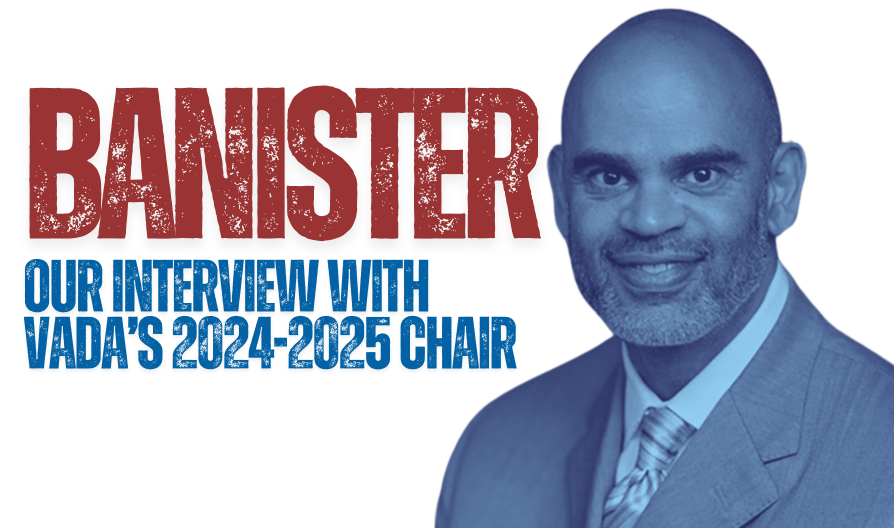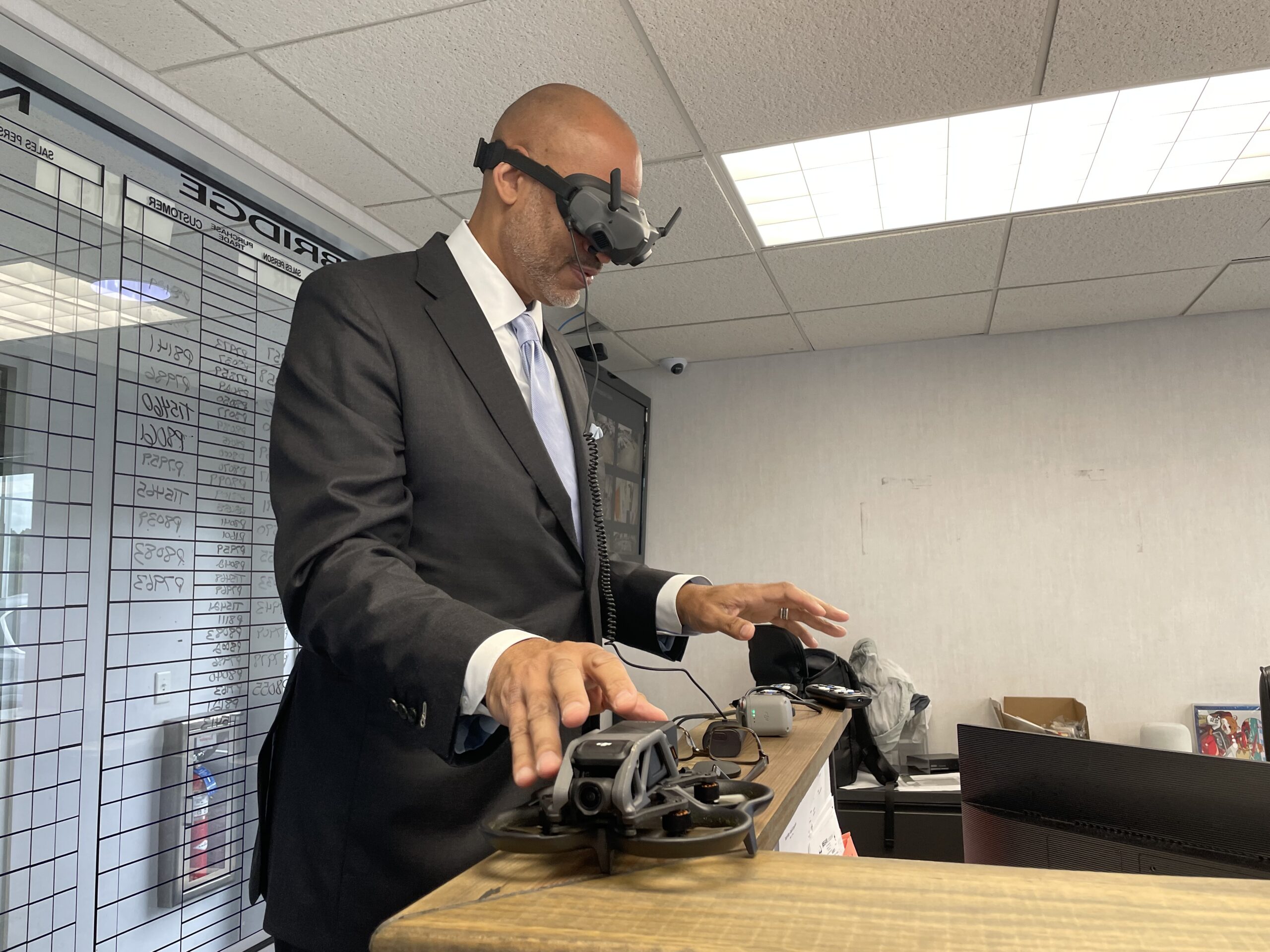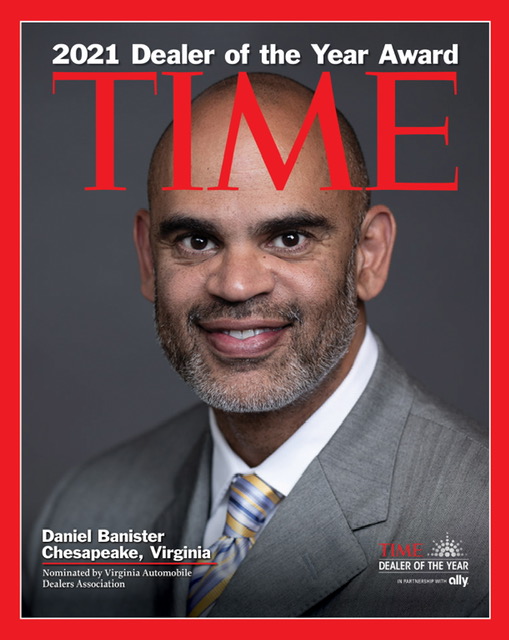August 2024
This month, we sat down with Dan Banister, VADA Chair and dealer principal of Banister Nissan of Chesapeake, Banister Nissan of Norfolk, Banister CDJR of Hampton, Banister Mitsubishi-Hampton, and Banister Ford of Marlow Heights, to discuss his journey, the automotive industry, and his leadership philosophy.
Banister, recognized as a 2021 TIME Dealer of the Year nominee for Virginia, began his automotive career in 1992 and quickly rose through the ranks to become a general manager of an underperforming Nissan store in Rock Hill, S.C, by 1998. His leadership turned the store around, leading to a role at Victory Nissan in Chesapeake in 2001. By 2010, Banister co-purchased Victory, expanding in 2014 with another store in Norfolk. In 2017, he assumed full ownership, establishing Banister Automotive, demonstrating his adeptness in business growth and development within the automotive sector.
 Banister was sworn in as chair earlier this year and has been a pivotal figure in the industry at the local, state and national levels. He is known for his dedication to community service and innovative leadership. (If you want to know his life story, here's his 2021 profile from his TIME nod.)
Banister was sworn in as chair earlier this year and has been a pivotal figure in the industry at the local, state and national levels. He is known for his dedication to community service and innovative leadership. (If you want to know his life story, here's his 2021 profile from his TIME nod.)
Our recent conversation covered major topics such as franchise laws, the challenges of electrification, and his vision for the future of the industry.
In your view, what are the most significant challenges facing the automotive industry?
Banister: One of the main issues are challenges to franchise law. If you recall, Tesla in the not-so-distant past was able to come in, kind of back door us. They bypassed many the laws that we as franchise dealers are held to. Telsa came to Virginia with little restrictions or oversight which put the rest of the dealer body at a disadvantage. Everyone needs play by the same set of rules.
EV’s: It seems as if every time we have an Administration change so does the EPA and EV requirements. We really like EVs, my kids drive them, but I believe that the market should decide on what cars we sell and drive. I have all the above philosophy. Internal-combustion engines, EVs, hybrids, hydrogen, etc. There are different needs for each driver. I don’t think we should had a one-size-fits-all approach.
How do you view the impact of EV mandates on the industry?
Banister: The EV mandates have had a significant impact. For instance, we've had manufacturers asking us to invest nearly $1 million to upgrade our facilities just to handle EVs, even though only about 5% of our sales are electric vehicles. That's a massive expense for us.
On a broader scale, manufacturers like Chevrolet, Stellantis, and Ford are losing considerable amounts of money trying to keep up with these EV mandates. Stellantis, for example, recently got hit with a substantial fine because they couldn't meet the EPA standards. This kind of pressure doesn't just affect the manufacturers; it trickles down to dealers and customers as well.
The costs associated with research and development for EVs are causing car prices to rise, as manufacturers try to recoup their losses. Moreover, the initial excitement around EVs, particularly during the early stages of COVID-19, has waned. Early adopters were eager, but factors like the lack of infrastructure and the high costs have significantly reduced the number of people interested in purchasing EVs today.

Banister loves his gadgets — here he is in 2022 showing his new drone, which he proceeded to fly around inside Banister Nissan in Hampton Roads.
How have you navigated the EV transition at your dealerships?
Banister: When I first bought my Ford dealership, the demand for EVs like the Mach-E and Lightning was through the roof. People were placing orders left and right, and I struggled to get inventory to meet that demand. But, as soon as the cars started arriving, the market shifted. Customers who were once willing to pay well over the list price suddenly lost interest, and we ended up with a lot of unsold inventory.
A similar situation occurred at our Nissan store. We had numerous pre-orders for electric vehicles, but by the time they arrived, the federal government had changed the tax credit rules. Because these cars were built outside the United States, they no longer qualified for the $7,500 tax credit, and customers backed out of their purchases. We were left holding vehicles that had been in high demand just months earlier but were now difficult to move.
It’s been a real challenge figuring out how to balance inventory and meet customer needs when things are changing so fast.
Beyond that, what has been the most challenging part of running a dealership recently?
Banister: One of the toughest challenges lately has been navigating the unpredictable shifts in both the used car market and the move towards electrification. The used car market, especially during and after COVID, has been incredibly erratic — prices have fluctuated dramatically, making it difficult to manage inventory effectively. We've had to carefully assess whether we’re acquiring cars at the right value and dealing with the complications of financing, with banks not always offering the support consumers need.
Finding and retaining good employees has also been a challenge. The expectations around work have changed significantly, and we’ve had to adapt by offering different types of roles and schedules. Some people are more comfortable in non-commissioned positions with stable hours, while others are motivated by commission-based roles with more flexible time.
It’s been about trying to adapt to these changes.
How do you view your role as the first Black chair in the history of the Virginia Automobile Dealers Association?
Banister: Wow! I am the first one, that’s interesting. I’m sure there will be many more in the future.
When it comes to trade associations or any organization, I think it’s important for people to find the best individuals for their teams. I hope in the future we see more people who look like me getting involved in these associations. There are a lot of talented dealers out there — some who look like me. Martin Luther King said, “Judge me on the content of my character, not the color of my skin.”
As a dealer body, the more of us who get involved and become visible, the better it is for everyone. I believe trade associations should represent the diversity we see in our society today. We’re in a time of change, and I believe our industry and its organizations should reflect that shift. But ultimately, I’m focused on getting the best people in the right positions, regardless of what they look like or the color of their skin.
We're in a service industry, but we also need to service our communities to make them better.
— Dan Banister, 2024-2025 VADA Chair
Dan was a main character in our recent video that highlights the importance of the automobile franchise system.
What are your thoughts on the upcoming Virginia legislative session and national elections, and that impact on the automotive industry?
Banister: We’re facing a lot of turnover in leadership, so it’s a period of building new relationships. I’m optimistic but cautious. We need legislators to understand the value of dealerships and support us through upcoming challenges. With so many new faces in the legislature, it's crucial to educate them on how the dealership network benefits the economy and the community.
How does Virginia compare nationally in terms of dealer associations?

Banister was named the 2021 Time Dealer of the Year for Virginia.
Banister: I think that you can probably liken it to one person, that's Don Hall. I mean, he's the ultimate leader. The relationships he has with [political] leadership, the relationships he has with the dealers. He sent the precedent. When Don Hall says something, everybody listens. He gets invited to a lot of different organizations across the country that value his opinion.
Just looking at most trade associations around the country, they're nowhere near where Don Hall has put VADA financially. They haven't increased fees and dues for years, and the way that he's been able to financially set VADA up for decades to come is impressive.
What keeps you involved with VADA, given your busy schedule?
Banister: Most of my career, I've been involved in some type of board, like with Nissan. I was on the dealer advisory board for 15-20 years. I'm on the advisory board with Ford. I was on the local trade association, Hampton Roads Automotive Dealers Association and I'm on a lot of nonprofit boards.
I like to get in there and get my hands dirty and see where there's opportunities for us to become better. When you can go in there and set the agenda and direct things, it's great. I'd like to be involved in building up from the ground level and focusing on things that are important to the dealer body.
What advice would you give to someone starting out in the dealership business?
Banister: My rule is, learn the job before you get the job. Make sure you're prepared when you get there so that you're ready to run off to the races. I've worked my way up from the ground, learning every position before taking on a new role. That experience is invaluable.
How do you handle the balance between professional and personal life?
Banister: Family is central to my life. When I bought my first store, I immediately closed the dealerships on Sundays. COVID hit, and we reduced our hours at all the stores. I haven't reverted back to our pre-COVID era schedule.
We try to teach people about life-work balance. We don't want work to be everything. We want to have a good balance. Anyone with kids and events, they need to go to those events.
How do leaders create a positive company culture?
Banister: We strive to create a family atmosphere in everything we do. I have an open-door policy and make an effort to connect with everyone when I visit our dealerships — whether it’s in the sales office, accounting, or service department.
I want people to feel comfortable coming to talk to me. The more honest feedback I can get from the staff and customers, the better our company can become. Being accessible, approachable, and accommodating is crucial. It's about creating a positive culture where people enjoy coming to work and leave with a smile on their faces.
Can you share some personal insights about your family and their involvement in the business?
Banister: I've been married for 27 years, have two kids that are in college and play college ball. My daughter is already committed to being a part of the business, and she's learning, doing some F&I work.
My son came from practice and sat in on a marketing meeting the other day. For me, it's about looking at the generational thing. Nothing would make me happier if they could be second-gen dealers.
How do you view community involvement and its importance to your business?
Banister: Community involvement is crucial. Many of the dealers I know have a charitable heart. You see it everywhere — whether it's on a college campus, high school, or even a local church, there's always a dealer supporting something, giving back in some way. Our dealer body in Virginia is full of people who are always looking to help others, whether it's through the Boy Scouts or other local initiatives.
We’re not like the big corporations; we're more like mom-and-pop shops, and we live and work in the communities we support. I want everyone who wears a Banister shirt to feel proud when someone says, 'Oh, you work at Banister? I love that you guys helped out with this, or you supported that.' It feels really good to hear those stories from staff, knowing we've made a positive impact.
We're in a service industry, but we also need to service our communities to make them better.
